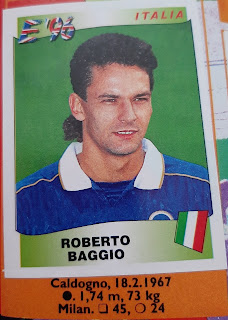193: Lucas Radebe, Leeds United, Merlin’s Premier League 97 Official Sticker Collection
The cultural impact of David Baddiel, Frank Skinner and The Lightning Seeds’ Euro 96 anthem ‘Three Lions’ is undeniable as proven when any England side in the Gareth Southgate era progressed beyond the group stage of a tournament. If Thomas Tuchel enjoys the similar stratospheric joy of barely surpassing expectations then it will be impossible to hold a conversation in the summer of 2026 without someone informing you “it’s coming home”. That being said it is rarely heard outside of England internationals and only then when there’s more at stake than a Nations League point. Perhaps the real breakout musical success of the football tournament genre was Dario G’s ‘Carnaval de Paris’ released ahead of the World Cup in France in 1998. Not only did the instrumentation for the song cover more nationalities than a Benetton advert but the earworm melody has been adopted by multiple clubs, and the England team, as a stirring terrace anthem. The dance trio actually gained inspiration for this absolute banger from a Sheffield Wednesday pre-season friendly against FC Utrecht where one of the Dutch side’s chants came back to Hillsborough which no doubt made new signing Orlando Trustfull feel at home. The heavy football influence on Dario G is probably no real surprise when you consider the trio are actually named after long serving Crewe Alexandra manager Dario Gradi.
The creative geniuses behind ‘Carnaval de Paris’ and ‘Sunchyme’ were not alone in looking to the world of football for band name inspiration. Mick Hucknall’s outfit Simply Red had less to do with their singer’s ginger locks and more to do with his passion for Manchester United. The Red Devils’ former talisman Eric Cantona lends his surname to a Seattle based outfit while there is more than one act named after Johan Cruyff. Others have taken their inspiration from clubs rather than players with French band Aston Villa, Welsh group Dynamo Dresden and Georgian soul act Red Star Belgrade sounding more like a tricky Champions League group than a gig line up. The most well known of these acts, however, would be Leeds natives Kaiser Chiefs who, sort of, take their name from South African side Kaizer Chiefs.
There are plenty of reasons to pay homage to the Johannesburg natives. First of all the club’s nickname the Phefeni Glamour Boys is a pretty good potential band name. In the last half-century they have amassed a huge international following, won multiple domestic trophies (as well as the CAF Cup Winners’ Cup) and boast the tenancy of the enormous Soccer City stadium. There’s also an iconic badge, snazzy kit colours and impeccably named former stars Doctor Khumalo, Ace Khuse and Wagga Wagga Likoebe. It was from this talented pool of players that Leeds United looked to strengthen their squad ahead of the 1994/95 season when they signed defender Lucas Radebe inadvertently paving the way to success for Ricky Wilson and his mates a decade later.
Radebe arrived at Elland Road shortly after compatriot Phil Masinga and made fifteen appearances in all competitions in 1994/95. Both men struggled for game time the following season, Masinga victim of Tony Yeboah’s sensational form, but Radebe’s willingness to fight for his place struck a chord with the Leeds’ faithful. On two separate occasions in the 1995/96 campaign he was called upon to do a stint in goal when John Lukic and Mark Beeney were injured and sent off respectively. His performance in the latter saw him pull of impressive saves from Andy Cole, Ryan Giggs and Brian McClair before finally being beaten by Roy Keane. It helped that Radebe had started his career between the sticks but his resolve struck a chord with incoming manager George Graham the following season and he became a mainstay in the Leeds defence for years to come.
During these years Leeds enjoyed five consecutive top five finishes in the Premier League as well as semi-final appearances in both the UEFA Cup and Champions League. Radebe was a key figure during this period of success until knee and ankle injuries took him out of the game for the entirety of the 2001/02 campaign. While he managed to get back to match fitness he struggled to retain a regular first team place and, amidst some awful financial mismanagement, Leeds dropped into the second tier in 2004. Radebe made just three appearances in the Championship before calling time on his career. In total he made 256 appearances for the club to go with his 113 for Kaizer Chiefs as well as 70 caps for South Africa who he captained at both the 1998 and 2002 World Cups.
It took Leeds United until 2020 to return to the Premier League during which time the club endured points deductions and relegation to the third tier. At the same time Kaiser Chiefs enjoyed critical acclaim and public adulation with a string of hits. To suggest the band’s success leant heavily on the performances of a former Leeds United centre-half is clearly farcical but building their foundations on such solidity as Lucas Radebe served the band, and both his clubs and country, well. It was undoubtedly a huge act of respect and admiration that led those behind such earworms as ‘I Predict A Riot’ and ‘Ruby’ to name their band after his former club, however, Radebe probably values the time his compatriot Nelson Mandela described him as “my hero” slightly higher.





Comments
Post a Comment